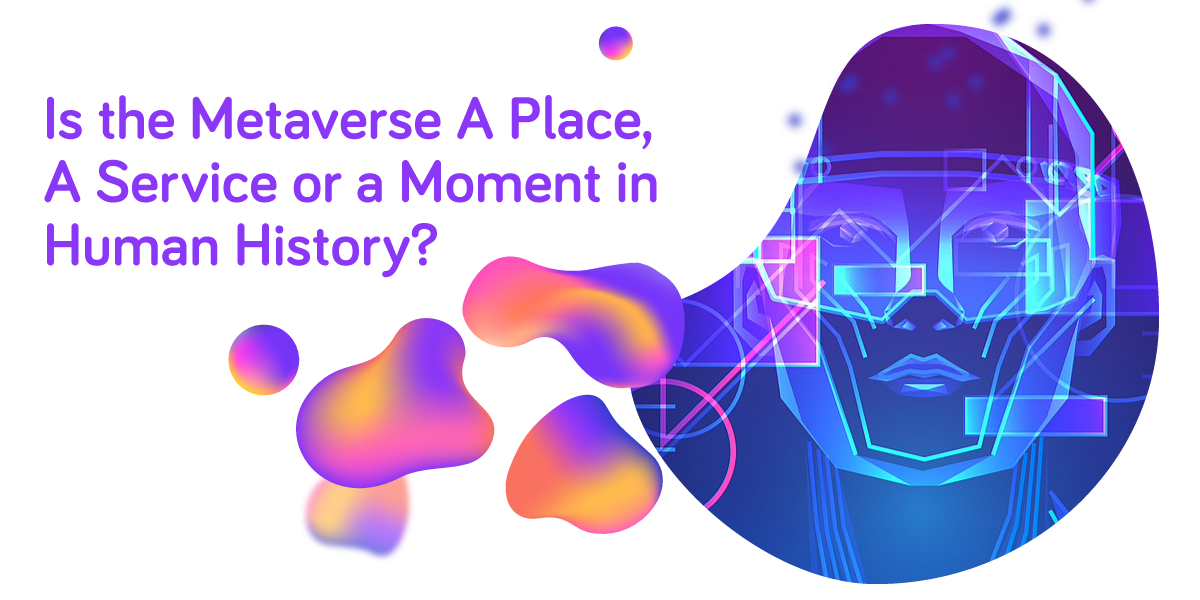The metaverse development is a new revolution in the world of the internet where everyone can interact and live their lives on the internet and in real life concurrently. As a new development, a lot of information and topics related to metaverse have been explored. Still, upholding the concept of metaverse as a virtual world built of virtual reality (VR) and augmented reality (AR) to form an alternative universe, this blog dives deeper into scrutinizing the concept. So, this article answers the fundamental questions on what the metaverse is in actuality. Is it a place? A service? Or a moment in human history?
Broadly, Metaverse refers to all these concepts.
The Metaverse as a Place
Among technophiles, the metaverse represents a place comparable to the physical world. In other words, it is a place where you can immerse yourself in any digital surroundings and engage in any physical reality, at any time.
The Metaverse allows you to see and feel anything even when you are hundreds of thousands of miles away from the physical place where an event is taking place. Therefore, the metaverse is a place where users can connect, interact and even transfer themselves and their belongings across different multiple digital locations.
Generally, the idea of the metaverse is to create a decentralized space or place built on blockchain technology so that it is not controlled by a person or any other entity. It aims to create a democratic nature of the real world in a digital space.
Imagine joining a celebrities’ concert in New York city using your phone seated right at your house. Another instance is whereby you put on a headset or a pair of goggles, then flick a switch and there you are walking and exploring the 3D world as an avatar. In these two scenarios, you can interact with friends in the same way you would do in a physical setting.
The Metaverse as a Service
The Metaverse as a service can be looked at from the perspective of enterprises. That is, the metaverse is seen as a strategy that will allow enterprises or organizations to develop and buttress their presence in a 3D virtual world to enhance investments, business processes, cryptocurrency adoption, and other use cases.
Important to understand, in this case, is that organizations will not be required to build their own metaverse but will benefit from the existing metaverse infrastructure. Thus, the metaverse will help people and businesses with services such as popularizing brands, selling and buying goods and services, collaborating with other organizations, making money, friends, and communicating with colleagues in the case of individual users.
The Metaverse as a service will help companies with limited digital experience to develop metaverse products. That means, both small and medium-sized businesses can engage in a metaverse economy without arduous capital costs.
Moreover, the metaverse encourages investment in what seems like an experimental technology. While a majority of businesses are yet to see the widespread release of metaverse services, the current metaverse developments allow companies to invest and gain from the technology with minimal risks.
The Metaverse as a Moment in Human History
Today, the metaverse is described as an intense immersive internet where users can access augmented and virtual reality and interact with various environments using avatars and innovative digital technology.
While the concept of metaverse may be new to some, the reality is that it is not a new thing. The metaverse is a development of a moment in human history. In other words, the cutting edge of metaverse technology refers back to some key historical milestones.
According to Forbes, the development of the metaverse goes back to 1838 when a scientist, Charles Wheatstone coined the term “binocular vision” where two images (each from one eye) were combined to make a single 3D image. Another milestone was achieved in 1935 following the publication of Stanley Weinbaum’s book, Pygmalion’s Spectacles.
The book’s protagonist explores a fictional world through a pair of goggles that enable the sense of taste, smell, touch, and hearing. In 1959 Morton Heilig created the first VR machine that simulated the experience of motorcycle riding by combining 3D video with audio, vibration, and scents to immerse the viewer.
From decade to decade, major developments have been achieved. Recently, in 2021, the world was caught by surprise when Facebook changed its name to Meta, an indication that the company focuses on shaping the future of the metaverse. Therefore, the metaverse is not a new thing but has been a moment in human history for a while now.
So what is the metaverse? It is a place, a service, and a moment in human history, depending on your own perspective. The metaverse will undoubtedly change the way our world works and the way we interact with each other.
Are you ready for a decentralized world in which reality is what you want it to be? The first step is delving into the world of blockchain and cryptocurrencies. Join IXFI and start your journey with Your Friendly Crypto Exchange to show you the way.
Disclaimer: The content of this article is not investment advice and does not constitute an offer or solicitation to offer or recommendation of any investment product. It is for general purposes only and does not take into account your individual needs, investment objectives and specific financial and fiscal circumstances.
Although the material contained in this article was prepared based on information from public and private sources that IXFI believes to be reliable, no representation, warranty or undertaking, stated or implied, is given as to the accuracy of the information contained herein, and IXFI expressly disclaims any liability for the accuracy and completeness of the information contained in this article.
Investment involves risk; any ideas or strategies discussed herein should therefore not be undertaken by any individual without prior consultation with a financial professional for the purpose of assessing whether the ideas or strategies that are discussed are suitable to you based on your own personal financial and fiscal objectives, needs and risk tolerance. IXFI expressly disclaims any liability or loss incurred by any person who acts on the information, ideas or strategies discussed herein.


